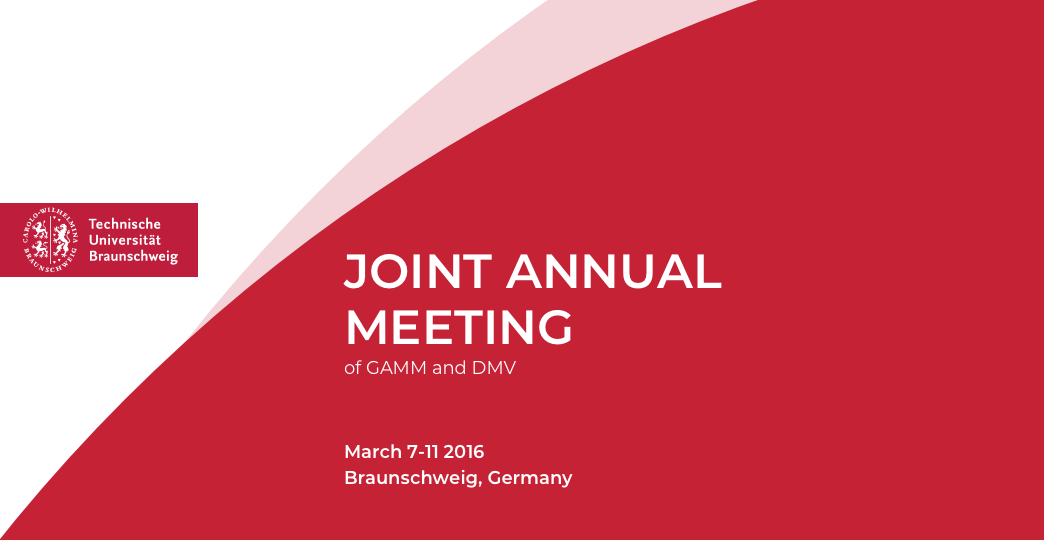MS 1 Computer algebra
Computer algebra, or symbolic computation, is devoted to solving mathematical problems using exact manipulations and algebraic algorithms. This also involves their implementation in software and hardware as well as applications. Modern computer algebra systems make a wide range of areas of pure mathematics accessible to experiments (in particular, in algebra, discrete mathematics, geometry, and number theory). Research in these areas has benefited immensely from this new approach over the past few years. The minisymposium provides an overview over some of these recent developments.
Organizers: Bettina Eick (Braunschweig), Anne Frühbis-Krüger (Hannover), Sandra Klinge (Dortmund), Eva Zerz (Aachen)
Speakers: Winfried Bruns (Osnabrueck), Tobias Moede (Braunschweig), Daniel Robertz (Plymouth), Martin Scheicher (Innsbruck), Werner Seiler (Kassel),
MS 2 Immersed boundary methods
Immersed Boundary Methods are an attractive way to represent arbitrarily shaped surfaces within a flow simulation. The formulation of immersed boundaries within (usually) Cartesian grids involves accurate numerical approximations in the fluid domain and efficient solvers. This usually goes in hand with an ease of generating the numerical grids. However, there are disadvantages concerning near wall resolution, smoothness of the solution at the wall. Accuracy, conservativity of variables and moving walls are current challenges addressed in this minisymposium.
Organizers: Stefan Hickel (München), Michael Manhart (München)
Speakers: Fabian Kurz (München), Vito Pasquariello (München), Christoph Lehrenfeld (Münster), Jochen Fröhlich (Dresden), Björn Müller (Darmstadt.)
MS 3 Linear and multilinear methods for electronic structure calculations
Electronic structure calculations simulate the quantum mechanical properties of electrons moving around clamped atomic cores. Usually, the underlying many body Schrödinger equation is extremely high dimensional. However effective single particle models, like the widely used DFT (density functional theory) still require the solution of large-scale non-linear eigenvalue problems.
Linear repsonse theory, for computed excited states etc., results in Bethe Salpeter and related equations: These problems have to be solved by numerical linear algebra techniques for large scale spectral problems.
Coupled cluster are non-linear and tensor network states are multi-linear parametrizations of the original many body wave-functions, which are preventing from the prohibitive combinatorial (exponential) scaling with the size of the system.
Organizers: Chao Yang (Berkeley, USA), Reinhold Schneider (Berlin)
Speakers: Gero Friesecke (TU Munich), Benjamin Stamm (Paris VI), Huajie Chen (Warwick), Anil Damon (Stanford), Amartya Banerjee (Lawrence Berkeley), Agnieszka Miedlar (Minnesota)
MS 4 Mechanics and model based control
Mechanics and Model Based Control are both rapidly expanding scientific fields and fundamental disciplines of engineering. They share demanding mathematical and/or system-theoretic formulations and methods. One of the challenges in Mechanics and Model Based Control is utilising the ever increasing computer power with respect to both, the simulation of complex physical phenomena in mechanics, and the design and real-time implementation of novel control systems. Further challenges follow from the availability of efficient multi-functional materials, so-called smart materials, and new fast and reliable communication techniques allowing the design and implementation of new types of actuator/sensor fields, distributed control and virtual networks. The mechanical and mathematical topics of this challenging development will be addressed by this minisymposium.
Organizers: Hans Irschik (Linz), Michael Krommer (Wien), Kurt Schlacher (Linz)
Speakers: A.K. Belyaev (St. Petersburg), R. Findeisen (Magdeburg), U. Gabbert (Magdeburg), S. Jakubek (Wien), M. Schöberl (Linz), Y. Vetyukov (Wien).
MS 5 Space-time methods for parabolic and hyperbolic PDEs
Modern discretizations of time-dependent PDEs consider the full problem in the space-time cylinder and aim to overcome limitations of classical approaches such as the method of lines (first discretize in space and then solve the resulting ODE) and the Rothe method (first discretize in time and then solve the PDE). A main advantage of a holistic space-time method is the direct access to time-space adaptivity and to the backward problem. Moreover, this allows for parallel solution strategies simultaneously in time and space.
Organizers: Stefan Sauter (Zürich), Olaf Steinbach (Graz)
Speakers: Roman Andreev (Paris), Matthias Maischak (Uxbridge), Martin Neumueller (Linz), Martin Schanz (Graz), Johannes Tausch (Austin), Christian Wieners (Karlsruhe).
MS 6 Robust simulation of mechanical systems with uncertainties
In the process of product development, the simulation of systems has gained increasing importance, and product design is primarily based on the simulation results. To guarantee the achievement of meaningful results, the parameters of the models have to be well known, which, however, is often not the case. In fact, the model parameters can exhibit a high level of uncertainty, arising as a consequence of different sources, such as natural variability or scatter, simplification and idealization in modeling, or deficiencies in identification. To solve this limitation, sophisticated strategies for a well-directed inclusion of uncertainties in the simulation process should be applied, resulting in a robust simulation with added value for the decision process.
Organizers: Jörg Fehr (Stuttgart), Michael Hanss (Stuttgart)
Speakers: Andrea Barth (Stuttgart), Matteo Broggi (Hannover), Jörg Fehr (Stuttgart), Carsten Proppe (KIT Karlsruhe), Matthias Faes (Leuven), Steffen Freitag (Bochum),
MS 7 Control of partial differential equations
Mathematical modeling leads to a description in terms of partial differential equations (PDEs) whenever time and space have to be considered as independent coordinates to properly represent the system dynamics. The control of PDE systems hence requires to combine control theoretic concepts with sophisticated mathematical tools including numerical techniques for simulation, optimization and implementation. This minisymposium will provide an overview of recent developments and their application.
Organizers: Thomas Meurer (Kiel), Frank Woittenek (Dresden)
Speakers: Nicole Gehring (München), MArtin Gubisch (Konstanz), Yann Le Gorrec (femto-st, Besançon), Philippe Martin (Paris), Paul Kotyczka (Lyon), Simon Kerschbaum (Erlangen)
